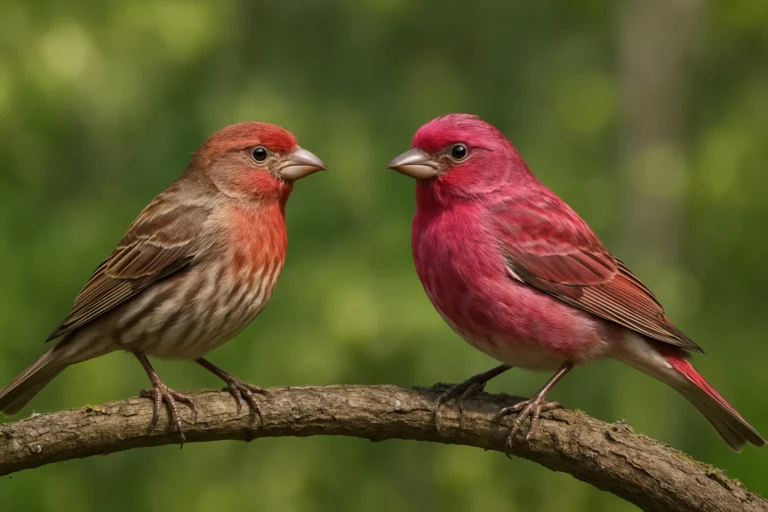Ever woken up to the sweet melody of chirping birds? It feels so good, doesn’t it? After all, it is one of the world’s most charming rituals: the dawn chorus. Some also say that it is a peaceful alarm clock that helps them wake up early. It gently wakes them up with a blend of the cheerful whistles of robins, the melodic warbles of blackbirds, the bell-like trills of thrushes, and the rapid chirps of sparrows.
But have you ever pondered why our feathered neighbors kickstart their day with such a joyful routine? If yes, then you are in for a treat. This magical concert isn’t just random. In fact, there are several reasons why birds chirp in the morning, including:
- Establishing a daily routine
- Attracting mates
- Marking territory
- Communicating with other birds
- Following their internal clock
- Maximizing sound clarity
So, without further ado, let’s dive into our first amazing reason that will definitely surprise you:
1. Establishing a Daily Routine
Here is the first and main reason for morning calls that avians often make. It’s just like we wake up, grab our coffee, and get ready for the day. Birds also have to establish a routine, and they do so by singing at dawn. Whether it’s the Eurasian blackbird (Turdus merula) or the common nightingale (Luscinia megarhynchos), they all use early morning songs to mark the start of their busy day. These chirps help them claim territory, connect with potential mates, and get a jumpstart on their daily activities.
2. Attracting Mates
For you, a bird’s early morning chirping can be just a soothing song. However, for some avians, it’s a remarkable way to exhibit their best characteristics. It’s like they are using their songs to say: “Look at me, I’m fit, healthy, and strong.” Males, in particular, sing to catch the attention of females. In other words, it’s a little performance to prove that they’re ready to be romantic partners. Take the Northern mockingbird (Mimus polyglottos), for example. To show off his skills, this guy sings a variety of crazy tunes.
3. Marking Territory
Sometimes, birds need to set boundaries to make sure that other birds don’t step on their toes. And how do they do so? Simple: by making morning calls. For some avians, those early wake-up chirps aren’t just melodies. Instead, these are used to make their territories. By letting out their loud, vibrant tunes, these feathered creatures are basically saying, “This is my space—back off!” For instance, the yellow warbler (Setophaga petechia) uses its distinct chirp to establish its territory.
4. Communicating With Other Birds
If you think birds are just solitary singers, you need to revisit your concept. They’re social creatures, as a matter of fact. Dawn songs help them communicate within their flocks. Some tweets may mean “I’m here,” while others might signal safety or call attention to a food source. In group-living species like European starlings (Sturnus vulgaris) or American crows (Corvus brachyrhynchos), vocalization is key to coordination and bonding. That said, morning chirping isn’t always a solo performance; it’s a roll call to ensure that everyone has made it through the night.
5. Following Their Internal Clocks
You must have heard about the internal clock that humans carry. Birds, too, have a circadian rhythm, which is finely tuned to the light-dark cycle of the Earth. The subtle increase in light at dawn triggers a hormonal response in them. It particularly contributes to a rise in testosterone levels in males during mating seasons. This spike is a signal that encourages vocal behavior. Birds like song thrushes (Turdus philomelos) use their morning chirps, perfectly timed with circadian rhythm, to respond to the natural light-dark cycle.
6. Maximizing Sound Clarity
Yes, it’s one of the many reasons why these winged animals sing melodious songs in the morning. You see, dawn is a quiet time. There’s less wind and almost no noise, making it the perfect time for birds to make sure their calls carry as clearly as possible. When there’s reduced background sound, their chirps travel farther, helping them communicate over long distances. Avians like Eastern meadowlarks (Sturnella magna) take full advantage of the calm to belt out their tunes.
Do All Birds Chirp in the Morning?
Does it feel like all the birds chirp at dawn? Not exactly. There are some exceptions that will amaze you. Some feathered friends do not join the dawn chorus. Some, like the nightjar (Caprimulgus europaeus), prefer the evening hours and sing their hearts out at dusk. And then you must know about owls, the nocturnal creatures. Barn owls (Tyto alba) are particularly full of energy at night. So, while we might be waking up to birdsong, these night-loving birds are just getting started when most of us are settling in for the night.
How Can You Enjoy the Dawn Chorus as a Birdwatcher?
If you are an enthusiastic birder, you might want to connect with these little creatures. What can be a better time than early morning to achieve this milestone? Here’s how you can enjoy the dawn chorus as a birdwatcher to feel closer to your feathered friends:
- Wake up about 30 minutes before sunrise
- Visit places like parks, gardens, or wetlands where bird activity is high
- Keep a journal to note down every species you see and hear
- Download apps like Merlin Bird ID or eBird to identify calls and log observations
- Avoid disturbing birds by staying still and quiet
These simple and practical tips will help you enjoy the soothing songs of birds in the morning and deepen your connection with them. In fact, birding at sunrise offers a more peaceful, rewarding experience. It allows you to witness the fascinating behaviors of birds while also enhancing your identification skills.
One Last Chirp
In short, the morning chorus that you enjoy every day is not just out of the blue. It serves a purpose. For some birds, morning singing is the act of communicating with fellow avians and making sure that they have made through the night. For others, it might be an attempt to impress the opposite gender. At the same time, some sing so early in the morning to establish a routine or mark their territories. In fact, as enchanting as the dawn melodies are, the reasons behind them are equally remarkable. And you know what? It should also be a part of your birdwatching routine. So, next time you hear those early chirps, take a moment, listen closely, and let the symphony of feathers guide you deeper into the world of birdwatching.
Oh! And do not forget to keep visiting our blog for more insights on birding and birds.


